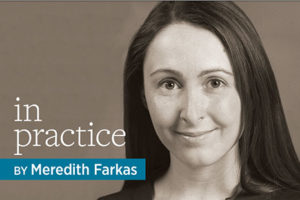
A core value of librarianship is open and equal access to the library for all members of our communities. User experience research has taught us that access means more than just letting anyone into our spaces; it requires creating spaces that make people feel like they belong. Unintentionally making some people feel unwelcome with our policies, programs, spaces, and services is very easy.
Another core value is intellectual freedom, and we have a long and proud history of supporting it in the face of censorship. Because we attempt to represent a diversity of perspectives in our collections, displays, and programming, most libraries contain material that some patrons might find offensive.
But what if a perspective repudiates the dignity and worth of a group of our patrons? What if a hate group discusses that perspective in your library’s meeting room? I can usually look to the American Library Association (ALA) Library Bill of Rights and Core Values of Librarianship for guidance, but there are situations in which individual values collide, particularly those around access, social responsibility, diversity, and intellectual freedom. How do we decide what takes precedence?
In July, some librarians were alarmed that the statement interpreting the Library Bill of Rights with regards to meeting rooms had been amended in June to explicitly state that hate groups cannot be excluded. While James LaRue, director of ALA’s Office for Intellectual Freedom (OIF), stated that the amendment reflects the current legal climate libraries face, others felt it suggested that librarians valued the rights of hate groups more than the safety of marginalized community members. After weeks of passionate debate and feedback, Council voted in August to rescind the changes and asked the Intellectual Freedom Committee to develop a new draft.
I recognize that the First Amendment, as interpreted by the courts, does protect hate speech in public forums like libraries. This does not mean that our professional association needs to proclaim that allowing hate groups to speak is in line with our library values. Our profession has protested laws and government actions when they have been at odds with our values, but I haven’t personally seen ALA address issues where our own values are in conflict.
Our values can’t exist in a vacuum—they must work for librarians in the real world
There’s also the issue of protecting libraries faced with hate, and ALA could play a valuable role there. Some libraries, such as Champaign (Ill.) Public Library, have content-neutral meeting room policies; ALA could offer more guidance on how to develop a policy that might help libraries deny meeting requests that could endanger patrons. It could offer guidance on how to communicate with and support community members who have been affected by hate groups. ALA’s Libraries Respond website is a start.
Our values can’t exist in a vacuum—they must work for librarians in the real world, where they often clash and must be reconciled. OIF must continue to engage with issues around diversity, equity, and social justice and consider those ideals when developing policy statements, just as units focused on diversity and social responsibility must consider intellectual freedom. For communities targeted by hate groups, these discussions are not academic but existential, and we must acknowledge how privilege may sometimes blind us to that in a profession that is 86% white.
As I mentioned in my January/February 2017 column, “Never Neutral,” neutrality replicates existing oppression. Being true to our professional core values around access, diversity, and social responsibility requires finding ways to make historically marginalized members of our communities feel that they belong in our libraries and are reflected in our collections, staffing, and services. Welcoming hate groups conflicts with that, and it’s something that we, as a profession, need to address holistically.


